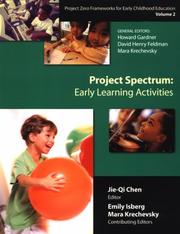| Listing 1 - 4 of 4 |
Sort by
|
Book
ISBN: 9780807766118 9780807766125 Year: 2021 Publisher: New York, NY Teachers College Press
Abstract | Keywords | Export | Availability | Bookmark
 Loading...
Loading...Choose an application
- Reference Manager
- EndNote
- RefWorks (Direct export to RefWorks)
"This groundbreaking book looks at the development of mathematical thinking in infants and toddlers, with an emphasis on the earliest stage, from zero to three, when mathematical thinking and problem solving first emerge as natural instincts. The text explores the four precursor math concepts-Attribute, Comparison, Change, and Pattern-with an emphasis on how development occurs when it is nurtured by loving knowledgeable others. The authors call this the CAIR principle: Closely Attend & Intentionally Respond. Sharing their stories of working with a wide range of zero to three caregivers and educators, the authors stress the difference between arithmetic skills and their definition of mathematics as "a logical way of thinking that allows for increasing precision." Each user-friendly chapter includes suggestions for highly effective practices that are embedded into everyday interactions and routines. Early care providers can use this resource to develop young children's interest in mathematics, ensuring that they are ready for the big ideas they will encounter in preschool. Book Features: · Combines the most current research on infant and toddler cognitive development in relation to mathematical thinking. Offers concrete ways to help caregivers and professionals draw out the math that is all around us. · Blends three domains of human development-social-emotional, physical, and cognitive. · Examines the What, Who, and How of each precursor concept, with authentic anecdotes and "What the Research Says" sections"--
Book
ISBN: 9781138182370 Year: 2019 Publisher: New York Routledge
Abstract | Keywords | Export | Availability | Bookmark
 Loading...
Loading...Choose an application
- Reference Manager
- EndNote
- RefWorks (Direct export to RefWorks)
Growing Mathematical Minds translates the findings of developmental psychological research related to early mathematics into narratives that are meaningful to teachers and readily applicable in early childhood classrooms. this highly useful book bridges the gap between research and practice, supporting teachers to adopt evidence-based practices and improve teaching by applying cutting-edge research findings. Growing Mathematical Minds describes findings that will affect teaching in ways that help children from three to eight years develop foundational math knowledge and skills, positive attitudes toward math, and basic abilities to think mathematically. (bron: covertext)
Book
ISBN: 0132946971 9780132946971 Year: 2014 Publisher: Boston Pearson
Abstract | Keywords | Export | Availability | Bookmark
 Loading...
Loading...Choose an application
- Reference Manager
- EndNote
- RefWorks (Direct export to RefWorks)


ISBN: 0807737666 0807738174 0807737674 0807737682 Year: 1998 Publisher: New York (N.Y.) : Teachers college press,
Abstract | Keywords | Export | Availability | Bookmark
 Loading...
Loading...Choose an application
- Reference Manager
- EndNote
- RefWorks (Direct export to RefWorks)
Children with social disabilities --- Curriculum enrichment --- Early childhood education --- Educational tests and measurements --- Performance in children --- Preschool children --- Project method in teaching --- Readiness for school --- Education (Early childhood) --- Activity programs --- Case studies. --- Rating of --- Testing --- Project Spectrum.
| Listing 1 - 4 of 4 |
Sort by
|

 Search
Search Feedback
Feedback About UniCat
About UniCat  Help
Help News
News